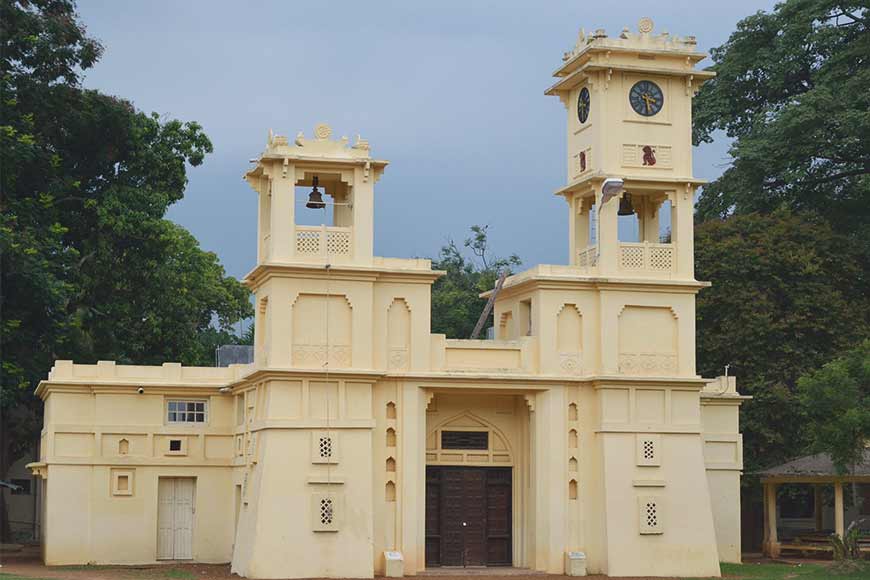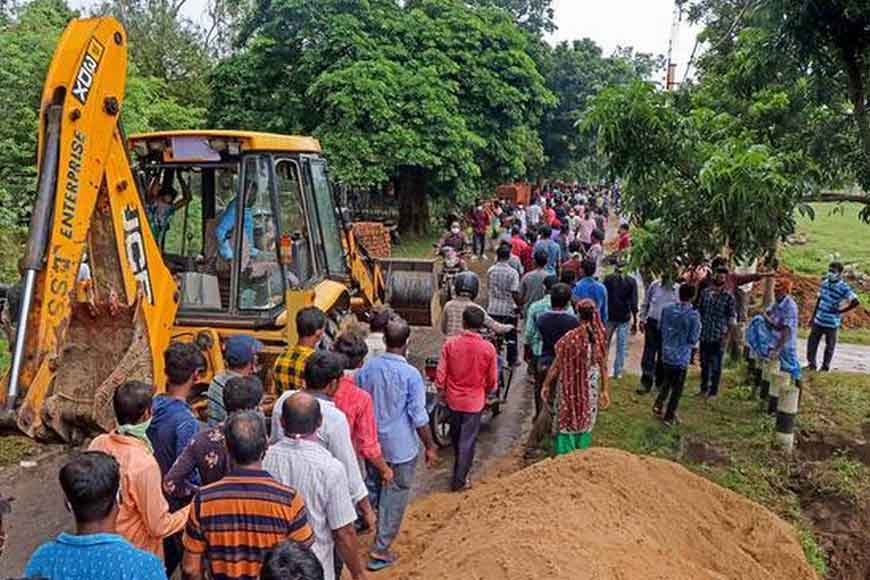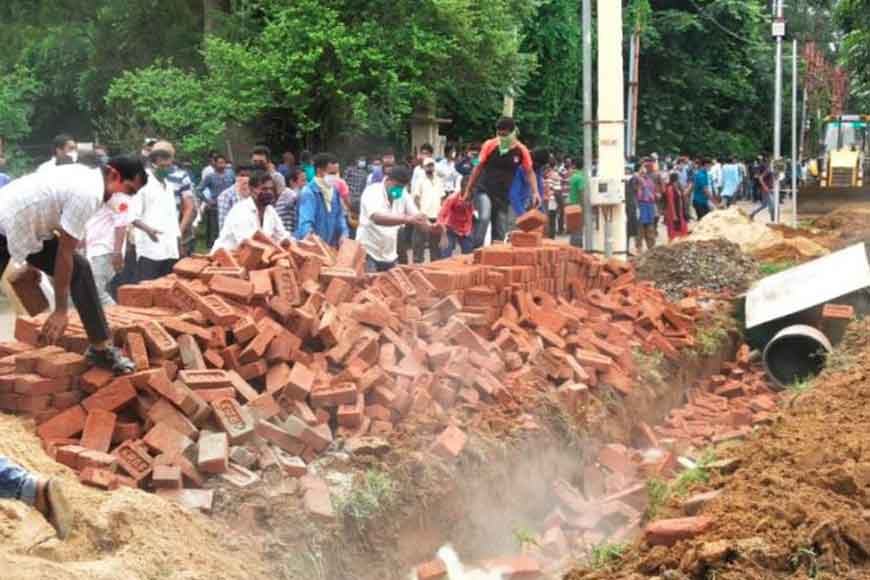Tagore wanted to break walls – then why walls coming up in Visva Bharati? Ashramites question

Rabindranath Tagore had once written ‘Chitto jetha bhoyshunnyo’ (Where the mind is without fear). The poem can be read as a list of prayers expressing the Nobel laureate’s vision of a free nation. Among many other wishes, he prays to the Almighty to awaken his countrymen in a world that ‘has not been broken up into fragments / By narrow domestic walls…’ Domestic walls is a complex symbol that can be interpreted in many ways. India has always accommodated diverse cultures, languages and kingdoms in its vast territory. It is a land of diversities. The poet doesn’t want these differences to divide his countrymen as separate individuals, or into clustered communities or groups.
Amader Santiniketan song rendered by Saptak, Santiniketan
On August 17, a large crowd of locals opposing recent construction activity initiated by Visva Bharati University authorities, turned violent and demolished two gates of the campus using a pay loader. The unruly crowd vandalized construction material stocked by the authorities to build a wall around the ground where the annual ‘Poush Mela’ is held. The fair draws thousands of people and even foreign tourists to the venue. A lawmaker said locals would never allow the University founded by Rabindranath Tagore which is largely an open air institution to be ‘Caged behind walls.’

However, Bidyut Chakrabarty, the current Vice Chancellor of the state’s only centrally-funded autonomous university, refused to budge from his decision. He insisted the wall was being constructed to ensure the safety of the campus and stop entry of outsiders. According to Varsity officials, the ‘proposed fence’ was necessitated by a 2017 National Green Tribunal order, as well as the recommendations and directions of various committees. It also indicated that as the owner of the venue, the university was well within its rights to construct a wall around it.
These claims were fiercely contested by numerous residents of Santiniketan, including students, ex-students, faculty members, shopkeepers and activists, who said the construction of walls around the university campus went against the ethos of Rabindranath Tagore, the founding father of Visva Bharati. They accused the current Vice Chancellor of being rude, authoritarian and insensitive to people’s emotional attachment with the university and the mela ground and said his decisions were creating a lot of friction between the university administration and students and residents of Santiniketan.
Octogenarian Sujit Chattopadhyay, an Ashramite and veteran resident of Santiniketan said, ‘All this murky business could have been avoided if only locals were taken into confidence, if the varsity officials had been more sympathetic to the sentiment of the residents before initiating construction work.’
Earlier there had been discussions about barricading the ground and the National Green Panel in its ruling in 2017 had okayed the varsity’s decision to ‘fence’ the area. ‘But fencing is not the same as building a concrete high wall, as is being done now,’ said Chattopadhyay. Besides, he enumerated, ‘There is no route map. Residents are confused about the entry and exit points.’ Citing his own age he said, ‘there are senior citizens and elderly couples who live here on their own. What about the safety and security of people our age who live behind the wall? What will they do if there is a sudden emergency in the house? How will an ambulance or a fire engine enter the lane?’ Like Chattopadhyay many Ashramites believe the VC’s decisions lack transparency.
A senior administrator of his stature should have anticipated the reaction of the locals if he imposed a vital decision that would clash with the interests of the residents. However, people like Chattopadhyay do not support the rampage. ‘I am truly saddened by the wide-scale rampage and destruction in this temple of education and culture. But I do believe that not all is lost yet. There is still scope for smoothening the rough edges. The VC or his representative should take the residents into confidence, seek their views, dispel their fears, declare the route map and then construct the fence (not wall, please).’
The VC has alleged that the ashramites and alumni of this institution remain aloof and are not willing to participate in developmental projects initiated by the varsity. Chattopadhyay retorted and said, ‘On the contrary, he is the one who keeps us at arm’s length. The previous VCs including Sujit Kumar Basu and Sushanta Dutta Gupta would always maintain a cordial relationship with us when they were in office. But now we don’t even get invited to prayers held on special days or prior to special events organized by the Varsity.’
Trouble between locals and the university administration had been mounting for several months. The first flashpoint was last year’s Poush Mela, when the VC reduced the fair’s duration from six to four days, increased the fees for stalls, refused to return the caution money deposited by stall owners and brought in police to evict traders and craftsmen from neighbouring villages and districts who overstayed on the premises. This was unprecedented in Visva Bharati’s history.
The demolition of shops in Ratan Pally in June this year amidst the lockdown was the next flash point. The VC was at the forefront in Ratan Pally, supervising the demolition of shops behind the post office that had been around for decades, providing a livelihood to several poor families. This happened in the middle of the lockdown, when the families were already severely affected, and contributed to people’s anger against the university administration.

The decision to construct a wall around the Poush Mela ground escalated these confrontations, more so because numerous people use the ground every day for walking, jogging, playing sports or meeting and chatting with friends. ‘The vandalism on August 17 was certainly condemnable,’ said Supriyo Thakur, a descendant of the Rabindranath Tagore’s family and former Principal of Patha Bhavan, the school Tagore set up. He was very categorical when he said, ‘I really don’t understand one thing. Has the security of the campus ever been compromised in any manner for all these years that necessitated the construction of a concrete wall to secure the safety of the campus? I definitely protest against the construction of the wall. If at all, the issue of encroachment could have been sorted by fencing the area.’
Supriyo Thakur also laments how the university is fast losing the last vestiges of Tagore’s legacy. One of Tagore’s last wishes, as expressed in his 1940 letter to Gandhiji, was that Visva Bharati ‘may claim special care from my countrymen for its preservation.’ That wish has been destroyed. Tagore gave Visva Bharati its motto: ‘Yatra Visvam Bhavatyekanidam’— where the world makes a home in a single nest. There are many nests in Visva Bharati today, all in very bad shape, and all in imminent danger of falling to the ground.
(Reporting by Tales Talks & Walks)









